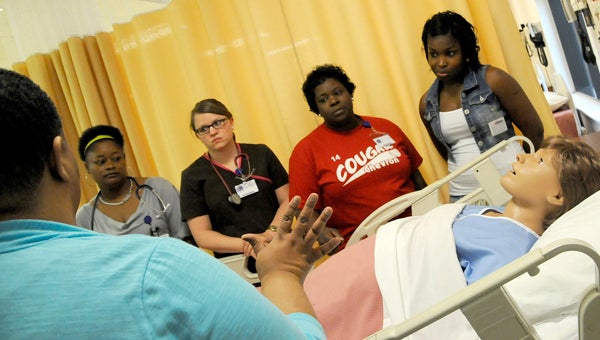Wallace welcomes new program
Published 10:34 pm Tuesday, June 10, 2014

earlie Miller, the licensed practical nurse instructor at Wallace Community College, left, teaches a level two maternal child nursing class at Wallace State Community College using a 3D model similar to the ones to used in the new WCCS Better Occupation Outcomes with Stimulation Training Program. — Sarah Robinson
Wallace Community College Selma will begin the fall season with a new medical program.
Starting in October, eligible WCCS students will have the opportunity to enroll in a Better Occupation Outcomes with Simulation Training program. Funded by and named after the Department of Labor’s Better Occupation Outcomes with Simulation Training program, the $3.25 million grant BOOST program allows students to earn three different medical certifications—electrocardiography, nursing assistant and phlebotomy—in three semesters.
“It’s allowing students more options, and it’s allowing them quicker paths to exit for employment,” WCCS BOOST program director Veronica Brown said.
Students may complete the entire program to earn all three available certifications or stop at any point after receiving one or two certifications.
For at least 15 years, WCCS has had an assistant nursing program, but the recent changes in pell grants criteria caused the program to no longer be approved for the pell grant. Therefore, several students depending on the pell grant to fund the program could not afford to participate.
As a result, WCCS stopped the nursing assistant program this past year, Brown said.
With financial support from the grant, students have access to high-tech equipment, such as 3-dimensional models of organs and body parts.
“Students will be able to view the anatomy model on these 3-D instruments that will let them view it all angles and bring it off the page for them versus the typical lab where you go in a cut and dissect to view the parts of animals,” Brown said. “We’re really excited about that.”
Brown said the program is also great for students interested in health care careers, but have struggled academically to get their grade point average to a level where they were eligible for other nursing programs.
“The first semester is specifically designed just for this cohort of students that we are dealing with to strengthen reading level, strengthen study skills, provide an introduction to health care courses and provide a introduction to medical terminology.”
Starting in the fall, the BOOST program will accept it’s first group of 48 students on a first-come-first-serve basis with plans to admit a new cohort each semester, Brown said.
Although the former nursing assistant program is no longer available, the fact the survey results revealed that 98 percent of students were employed six months graduation makes Brown confident that the BOOST program will also be successful.
“From this program we will be able to build other health programs,” Brown said. “This is just a start. We see great things coming from this.”





